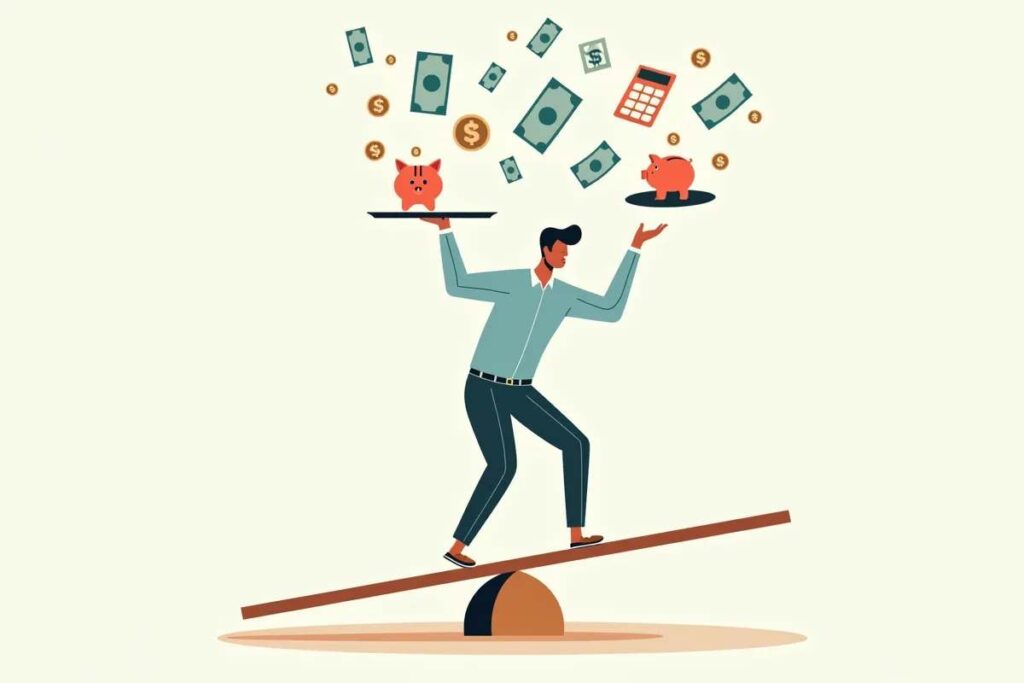Introduction
Your palms start sweating as you reach for your phone to check your bank balance. Sound familiar? You’re not walking this financial tightrope alone. In fact, a recent Federal Reserve study shows that 36% of Americans would struggle to cover an unexpected $400 expense. Financial stress—that knot in your stomach when bills pile up or emergency expenses hit—affects everyone from minimum wage workers to high-earning professionals. But here’s the silver lining: understanding the roots of financial stress is your first step toward mastering it, and we’re here to guide you through every step of that journey.
Understanding Financial Stress
What is Financial Stress?
Financial stress is the state of discomfort and anxiety we often feel when our wallets start feeling way lighter than our worries. It’s not picky—anybody can feel it, whether they’re bringing in the big bucks or just scraping by. Those moments when bills stack up, surprise expenses hit, or debt grows can make anyone’s head spin. Plus, this money-related stress can mess with your mental peace, shake up relationships, and leave you feeling less productive.

Common Causes of Financial Stress
There are heaps of things that can crank up financial stress. Getting a handle on these stressors can help folks spot what’s causing their headaches and figure out how to tackle them. Here are some top reasons people feel the pressure:
| Cause | What’s Going On |
|---|---|
| Job Loss | Losing or having a shaky job makes keeping up with money matters a real nail-biter. |
| High Debt Levels | Those pesky credit card bills or hefty student loans can loom like a dark cloud. |
| Unexpected Expenses | When your car suddenly needs fixing or you’re hit with a big medical bill, it can truly stretch the budget. |
| Poor Financial Literacy | Not having the know-how to budget or manage funds can leave you feeling lost and frazzled. |
| Economic Conditions | Wobbly economic stuff like inflation or a downturn can make you jittery about the future. |
| Insufficient Savings | Without a “just-in-case” fund, surprise financial hiccups can take a toll. |
For folks feeling the pinch, it’s wise to dig into resources and tips on taming financial stress. Budgeting apps and leaning on supportive networks can lighten the load. To get a grip on stress management in other parts of life, you might want to check out work stress management and stress management plans.
“The number one problem in today’s generation and economy is the lack of financial literacy.” – Alan Greenspan, Former Federal Reserve Chairman
Recognizing the Signs of Financial Stress
Spotting signs of financial stress can lead folks to nip problems in the bud before things get outta hand. This kinda stress doesn’t just mess with your mind; it can show up as emotional, behavioral, and physical symptoms.
Emotional and Behavioral Symptoms
Money woes can totally wreck your mood and how you roll day-to-day. Here’s a quick look at some telltale signs:
| Emotional and Behavioral Whammies | What’s Going On |
|---|---|
| Anxiety | You’re always on edge, fretting over dough. |
| Frustration | Snapping at people more than usual? Feel that? |
| Depression | Feeling like you’re in a funk over what’s ahead cash-wise. |
| Withdrawn Behavior | Ducking friends or family, especially when there’s talk of finances. |
| Difficulty Concentrating | Can’t keep your mind on anything cuz you’re stressing over bills. |
| Sleep Changes | Whether you’re counting sheep for hours or sleeping like Rip Van Winkle. |
Catching onto these vibes early can help anyone get a leg up on tackling financial stress. It’s not a one-man show—many are in the same boat, so don’t feel you’re riding solo.
Physical Symptoms
Money stress is like that annoying mosquito bite—it doesn’t just bug your head but also shows up in the body. Peep some of the common signs below:
| Physical Symptoms | What’s Going On |
|---|---|
| Headaches | Frequent head-bangers from all the stress knots. |
| Muscle Tension | Your shoulders and neck feel like they’re made of iron. |
| Digestive Issues | The stomach doing flips, no acrobatics needed. |
| Fatigue | Dead tired, yet sleep doesn’t seem to help. |
| Rapid Heartbeat | Your heart’s racing like a horse whenever stress kicks in. |
If you wanna dive deeper into how stress can send your body into a tizzy, check out our piece on physical symptoms of stress. Bringing in the pros or chatting with someone you trust about these issues could point you to some sanity-saving steps.
To really put the lid on financial stress, it’s key to tackle both the head stuff and the bodily feels. Getting into things like mindfulness and other chill-out methods can work wonders. For more ideas on how to quickly chill out, scope our article on quick stress relief techniques.
Practical Ways to Handle Financial Stress
Feeling bogged down by money problems might make you want to hide under the covers all day. But guess what? With a little plan, those worries can shrink a bit. Let’s look at some real-deal ways to ease that wallet pressure.
“Do not save what is left after spending, but spend what is left after saving.” – Warren Buffett
Check Out Your Money Scene
First up, take a good look at what’s coming in, going out, and sitting in your bank. Knowing the real deal about your cash can help spotlight problem areas screaming for attention.
Here’s a quick money map for you:
| Financial Aspect | Amount ($) |
|---|---|
| Total Monthly Income | $ 10000 |
| Total Monthly Expenses | $ 5000 |
| Total Debt | $ 3000 |
| Savings | $ 2000 |
Consider this your money GPS, guiding you on where to start tweaking things.
Make a No-B.S. Budget
Next, get a budget going. Think of it like your road map to where your dollars are running off to. Keeping it realistic is crucial—don’t forget to save a little dough each month too.
Here’s a basic guide to get you rolling:
| Expense Category | Monthly Allocation ($) |
|---|---|
| Housing | $ 2000 |
| Utilities | $ 1000 |
| Food | $ 1500 |
| Transportation | $ 800 |
| Debt Repayment | $ 1600 |
| Savings | $ 1200 |
| Fun Money | $ 500 |
This setup can help you eyeball and tweak your spending habits as you go along.
Stack Your Bills
All bills aren’t created equal. Some need attention before others do. Nailing down the must-pay expenses first can lower your stress levels. See below for a priority hack:
| Expense Type | Priority Level |
|---|---|
| Must-Pay Bills | High |
| Extras | Medium to Low |
By making sure the crucial stuff’s covered, you can keep money worries at bay a bit better. For extra help with stress, check out some quick stress relief tricks.
By scoping out where your cash is, setting up a fail-safe budget, and making sure the right bills are paid first, you can steer through crunch times better and breathe easier.

Building a Support System
Taking on financial stress alone can be a tough gig, but with a solid support system, it feels a bit more do-able. Having folks around who get it can offer both a shoulder to lean on and some neat tricks for tackling stress.
Talking to Family and Friends
When money gets tight, having a chat with those who care about you can bring a bit of relief. Letting them know what’s up can ease the burden and, who knows, you might just pick up a few gems of wisdom from their own life stories.
| Benefits of Chatting with Loved Ones | Whatcha Gain |
|---|---|
| Feel the Love | Sharing helps you feel less alone in the mess. |
| Get Handy Tips | Loved ones might have some cool suggestions. |
| See Things in a New Light | They might help you view things a bit clearer. |
Honest convos about cash woes build a vibe of trust and togetherness. Want more ways to chill out while chit-chatting? Pop over to our page on quick stress relief techniques.
Seeking Professional Help
Sometimes, it’s good to call in the cavalry by seeking a pro’s advice. Financial counselors, therapists, and financial advisors are the go-to people for sorting both the mind and the wallet. They’ve got the smarts to help you manage your money and the stress that comes with it.
| Types of Professional Help | What’s in it for You? |
|---|---|
| Money Coaches | They’ll set you up with a budget and plan to sort expenses. |
| Therapists | They dig deeper into how money stress messes with your head. |
| Investment Advisors | They make sense of savings and investment plans. |
Finding the right pro can do wonders for your peace of mind over the long haul. If you’re looking to whip up a personal stress management plan, we’ve got heaps of info to get you started. Finding the right help can really take the stress down a notch.
Managing Debt and Expenses
Feeling swamped by bills? Don’t worry—it happens to the best of us. With some smart moves and a sprinkle of willpower, reducing debt and cutting down expenses isn’t a pipe dream but a manageable task.
Strategies to Reduce Debt
Cutting debt down a size calls for a game plan. Check out these down-to-earth tricks:
Build a Debt Repayment Map: Jot down every debt—balances, what the interest rates are, and minimum dues. Knowing where you stand is half the battle.
Zap High-Interest Debts First: Zero in on paying those hefty-interest debts first. Doing so helps nip extra interest payments in the bud.
Think Debt Consolidation: Drowning under a pile of bills? Stick them together with a loan so you have just one, potentially cheaper, payment to handle.
Chat with Creditors: Sometimes, a friendly call to your creditors can work wonders. Ask them for friendlier interest rates or a break on terms.
Wise Windfall Usage: That unexpected cash? Instead of splurging, toss it towards your debt. A tax refund or bonus can be a debt’s worst enemy.
| Strategy | Description | Possible Upside |
|---|---|---|
| Build a Debt Repayment Map | List debts and tally up payments | Grasp on your debt pile |
| Zap High-Interest Debts First | Target highest-rate debts | Fewer interest lunges |
| Think Debt Consolidation | Roll debts into one neat loan | Easier payment dance, possibly cheaper |
| Chat with Creditors | Haggle for nicer interest or terms | Cushier payback options |
| Wise Windfall Usage | Funnel bonus money to debt | Faster downhill on debt |
Tips for Cutting Expenses
Once the debt monster’s tamed, it’s time to tackle those everyday costs. Here’s how to keep those pennies under control:
Snoop the Spending: Jotting down every dollar spent shines a light on sneaky spend spots.
Craft a Budget: Map out a budget that curbs overspending and backs up your money dreams.
Scrap Needless Subscriptions: Those auto-renew payments? Kill ’em if you barely remember signing up.
Strategic Shopping: Always hit the store with a plan and a list, and don’t say no to a sweet deal or two.
Home Cooking: Turning up the stove more means saving cash and picking up healthier eating habits.
| Expense Type | Monthly Average ($) | Money-Saving Tip |
|---|---|---|
| Groceries | 400 | Menu plan and list hits |
| Dining Out | 150 | Cap on eating out |
| Subscriptions (streaming, etc.) | 50 | Slash unused memberships |
| Utilities (electricity, water) | 200 | Power down that unused light |
| Entertainment | 100 | Hit up free local fun happenings |
Wrestling debt and reigning in expenses aren’t as mind-boggling once you roll out these tactics. They are golden keys to keeping financial stress at bay. Want more tips on chilling out about finances? Check out our quick stress relief techniques and stress management plans.

Exploring Extra Cash Opportunities
Getting some extra cash rolling in can be a great way to ease money worries. Let’s talk about two key options: picking up some side gigs and cashing in on passive income.
Side Hustles and Freelancing
Side gigs are all about flexibility. You can squeeze ’em in around your main gig and keep the cash flow going. Freelancing’s your ticket to cashing in on what you’re already good at. Some popular side gig options include:
| Gig Type | Possible Earnings (Hourly) |
|---|---|
| Retail or Food Service | $10 – $20 |
| Tutoring (Based on Subject) | $15 – $50 |
| Pet Sitting or Dog Walking | $15 – $30 |
| Freelance Writing | $20 – $150 |
| Graphic Design | $25 – $100 |
Keep in mind, these are ballpark figures and can change based on where you are, how many folks want the service, and how much you know your stuff. Snagging a side gig or freelance job doesn’t just line your pockets—it also helps you learn new tricks and meet people in the biz. If you’re curious about keeping your cool while juggling jobs, check out our article on work stress management.
Passive Money Makers
Passive income’s like the gift that keeps on giving without you lifting a finger once it’s set! Here’s a look at some common passive cash streams:
| Passive Income Route | What’s the Deal? |
|---|---|
| Rental Properties | Buy a place, rent it out |
| Dividend Stocks | Invest in shares that shell out dividends |
| Affiliate Marketing | Earn bucks by sharing special product or service links |
| Online Courses | Create and sell your educational know-how |
Be ready for a bit of elbow grease or upfront cash to get passive income started, but it could mean a smoother financial ride down the line. Those wanting to tackle stress from budgeting can peek at our stress management plan. Giving these income options a go can really help lighten the load of financial stress.
Trying out different ways to earn can put the financial helm right in an individual’s hands, sparking a sense of security.
Self-Care and Stress Management
Handling money worries isn’t just about dollars and cents—it’s about taking care of yourself too. Prioritizing your well-being gives you the juice to face those pesky financial problems without feeling like the world’s sitting on your shoulders.
Prioritizing Self-Care
Keeping yourself sane while your wallet weeps is a big deal. Self-care is about striking a balance, making sure that amidst the chaos, you’re still tending to your own needs. Fitting a bit of self-care into your everyday life can really give you a leg up when it all starts piling up.
Here’s some self-care stuff you might wanna try:
| Self-Care Activity | Description |
|---|---|
| Regular Exercise | Get moving to shake off the blues—exercise kicks those happy chemicals into gear. |
| Healthy Eating | Eating right isn’t just good for the waistline; it feeds your brain, too. |
| Sufficient Sleep | Without enough zzz’s, everything feels harder—sleep’s your best friend when things get rough. |
| Relaxation Techniques | Try yoga or meditation to find your zen. A few quiet moments do wonders. |
Want a deep dive into how diet can chill you out? Our article on stress-busting foods has all the tasty info.
Stress-Relief Techniques
When money matters are freaking you out, having a bag of stress-busting tricks at the ready can really help. Check out these nifty stress-relievers:
| Technique | Description |
|---|---|
| Deep Breathing | Take some slow breaths to quiet the chaos. Try our breathing exercises for a peaceful mind reboot. |
| Mindfulness Meditation | Staying present keeps the worry monsters away—it’s like a mini-vacation for your brain. |
| Physical Activity | Whether it’s a sprint or a shimmy, moving your body helps shake off stress. Peek at our top moves to de-stress. |
| Journaling | Jotting down your thoughts can be like talking to a therapist on paper. Need a prompt? Our journal ideas are here to help. |
| Nature Therapy | Mother Nature’s got your back—she’s a master at helping your brain relax. Uncover more with nature therapy. |
And hey, knowing about cortisol—the trouble-making stress hormone—might shed some light on your stress levels. Too much of this bad boy can wreak havoc on your health. Curious for more? Dig into our bit on cortisol.
Taking the time to pamper yourself and tackle stress head-on not only helps you keep your head above water but also boosts your mental fortitude. Incorporating these strategies into your daily vibes can change the game, offering a healthier mental space and a more resilient mindset for dealing with life’s curveballs.
Planning for the Future
Think about the future and you’ll find less financial anxiety. Having a solid game plan gives you a sense of control over what’s coming up financially. Plus, it’s good to have something to guide you through potential bumps.
Setting Financial Goals
Ever feel like you’re just treading water with your money? Setting some clear goals can throw you the lifebuoy you need. Keep your goals tangible and within reach by using the SMART approach—Specific, Measurable, Achievable, Relevant, and Time-bound. Here’s a quick breakdown to get you started:
| Goal Type | Example | Time Frame |
|---|---|---|
| Short-term | Saving for a vacation | Within a year |
| Medium-term | Paying down credit cards | 1-5 years |
| Long-term | Saving for retirement | 20+ years |
Writing goals down can solidify them in your mind, and reviewing them often keeps you on track. Think of goals as big chunks you can split into bite-sized pieces. For a closer look at managing money stress, have a peek at our stress management plan.
Creating a Long-Term Financial Plan
Think of your long-term plan as your GPS for finances. It guides you through saving, investing, and living within your means. Here’s how to kick off the planning:
Size Up Your Money Situation: Take stock of your income, savings, investments, and what you owe.
Lock in Your Goals: Be clear on your short and long-term targets.
Craft a Budget: Make one that suits your life but don’t stick to it like glue—adjust when life throws a curveball.
Savvy Investing: Choose investments that fit your comfort zone and goals. A mixed bag of strategies keeps things interesting.
Keep It Fresh: Have a routine check-in with your plan to tweak things as needed.
| Action Item | Frequency | Notes |
|---|---|---|
| Review budget | Monthly | Make changes if you’re off course |
| Check investments | Quarterly | Make sure they match your goals |
| Update goals | Annually | Ensure they fit your current life |
The right tools make the planning process smoother. If you need to relax or focus while planning, our best stress relief techniques can come in handy.
By nailing down practical financial goals and sticking to a well-thought-out plan, you won’t just reduce the worry tied to finances—you’ll also find yourself on a clearer path to monetary safety that’s easier to navigate.
Conclusion
The path to financial peace isn’t a straight line—it’s a journey filled with learning curves and small victories. By understanding the signs of financial stress, implementing practical solutions, and building strong support networks, you can transform your relationship with money from one of fear to confidence. Remember, every financial expert started as a beginner, and every debt-free individual once faced their own money struggles. Whether you’re taking baby steps with a basic budget or diving deep into investment strategies, each action moves you closer to financial wellness. The tools and strategies we’ve explored aren’t just theories—they’re your practical roadmap to financial peace of mind. Take that first step today, because your future self will thank you for starting now.
FAQs:
1. How quickly can financial stress affect mental health?
Financial stress can impact mental health immediately, with effects ranging from anxiety to sleep disruption within days of financial difficulty.
2. What’s the most effective first step in managing financial stress?
Creating a simple income and expense tracker is the most effective first step, as it provides clarity and control over your financial situation.
3. How can I manage financial stress while paying off debt?
Combine practical strategies (debt snowball/avalanche methods) with stress management techniques like mindfulness and seeking support from financial counselors.
4. Is it normal to feel ashamed about financial stress?
Yes, feeling shame about financial stress is common, but remember that 73% of Americans rank money as their number one source of stress—you’re not alone.
Additional resources
Federal Reserve’s Economic Well-Being Report: www.federalreserve.gov/publications
Financial Therapy Association: www.financialtherapyassociation.org
National Endowment for Financial Education: www.nefe.org
Financial Planning Association: www.fpa.org
The Balance Money Management: www.thebalance.com






